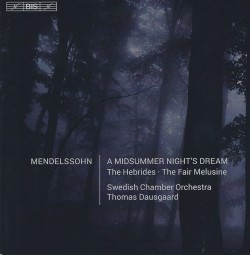 Mendelssohn – A Midsummer Night’s Dream; Hebrides Overture; Fair Melusine Overture
Mendelssohn – A Midsummer Night’s Dream; Hebrides Overture; Fair Melusine Overture
Swedish Chamber Orchestra and Radio Choir; Thomas Dausgaard
BIS Hybrid SACD 2166
Felix Mendelssohn was born in Hamburg on February 3, 1809, and a no more prophetic name than Felix (Latin for “happy”) could have been given him if his music tells the tale. His ebullient Overture to A Midsummer Night’s Dream was written when he was 17 and was followed 17 years later by more miniatures to comprise a suite of Incidental Music. That he chose to compose these extra pieces populated by those same scampering fairies of the Overture was brilliant.
The Incidental Music is composed of the Overture that sets the stage and introduces the cast, followed by 13 pieces including the Scherzo, Nocturne, Intermezzo, Wedding March and other delights.
Dausgaard’s tempi may feel slightly headlong, with an impetuosity that imbues a breathtaking expectancy even when we know the score well. This is a performance that has the listener leaning forward so as not to miss a single, unexpected nuance. Constant re-evaluation of textures in almost every chord is different in weight and balance from what we are used to, keeping us alert for what is to come. We can see those fairies being as disruptive as they are in Shakespeare.
The uniquely mid-nineteenth-century quality of the score is brought out with extremely precise orchestral execution, transparent and articulate, adding a zing unlike any others. This is pure Mendelssohn and, for me, exemplary.
Similarly, the two familiar overtures are meticulously prepared, drawing even a blasé listener into these interpretative revelations and performance bench marks.
Concert Note: On April 9 and 10 the Toronto Symphony Orchestra presents “A Midsummer Night’s Dream & More” featuring Mendelssohn’s incidental music, Handel’s Harp Concerto, Elgar’s Enigma Variations and Wagner’s Ride of the Valkyries under the baton of James Feddeck in his TSO debut.



